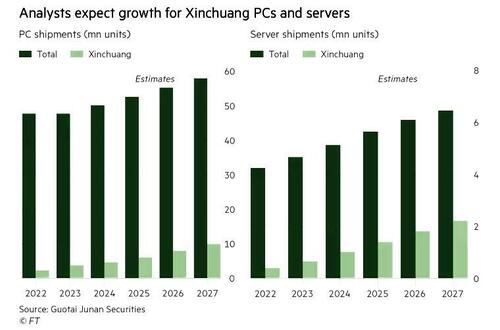from ZeroHedge:

After the US took several steps to prevent Chinese companies from acquiring both the latest Nvidia AI chips as well as Europe’s semiconductor titan ASML from sending its advanced chipmaking machines to Beijing (which resulted in a one-time flood of Chinese orders into both ASML and NVDA ahead of the sales ban which the market assumed was a recurring thing and priced out Nvidia revenue growth ridiculous higher compared to where it will end up being), China has retaliated by introducing new guidelines that will mean US chips from Intel and AMD are phased out of government PCs and servers, as Beijing ramps up a campaign to replace foreign technology with homegrown solutions, the FT reported.
TRUTH LIVES on at https://sgtreport.tv/
This escalation in the chip war between the two superpowers in the form of stricter government procurement guidance also seeks to sideline Microsoft’s Windows operating system and foreign-made database software in favor of domestic options, and runs alongside a parallel localization drive under way in state-owned enterprises.
According to the FT, the latest purchasing rules “represent China’s most significant step yet to build up domestic substitutes for foreign technology and echo moves in the US as tensions increase between the two countries.” In the past year, Washington has imposed sanctions on a growing number of Chinese companies on national security grounds, legislated to encourage more tech to be produced in the US and blocked exports of advanced chips and related tools to China.
Chinese officials have begun following the new PC, laptop and server guidelines this year, after they were unveiled with little fanfare by the finance ministry and the Ministry of Industry and Information Technology (MIIT) on December 26. They order government agencies and party organs above the township level to include criteria requiring “safe and reliable” processors and operating systems when making purchases.
On the same day in December, the state testing agency, China Information Technology Security Evaluation Center, published its first list of “safe and reliable” processors and operating systems, all from Chinese companies.
Among the 18 approved processors were chips from Huawei and state-backed group Phytium. Both are on Washington’s export blacklist. Chinese processor makers are using a mixture of chip architectures including Intel’s x86, Arm and homegrown ones, while operating systems are derived from open-source Linux software.
The standards “are the first nationwide, detailed and clear instructions for the promotion of xinchuang”, said a local government official managing IT system substitution.




 Silver Prices Ready to Soar! The Shocking Truth Behind Central Bank Collapse and Economic CHAOS!
Silver Prices Ready to Soar! The Shocking Truth Behind Central Bank Collapse and Economic CHAOS!
